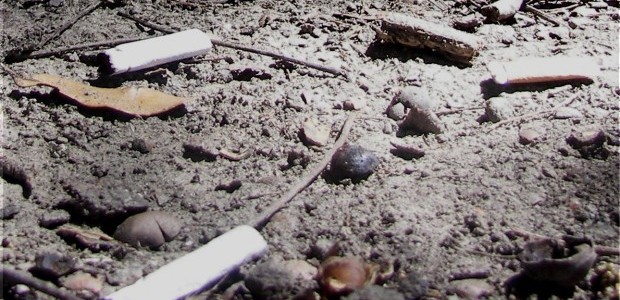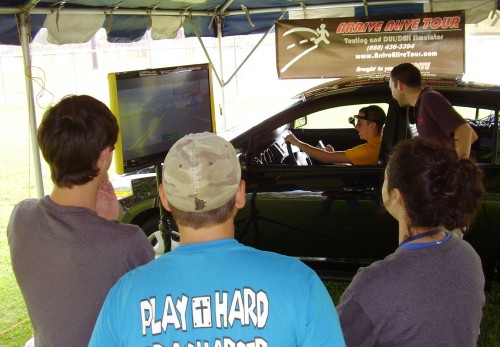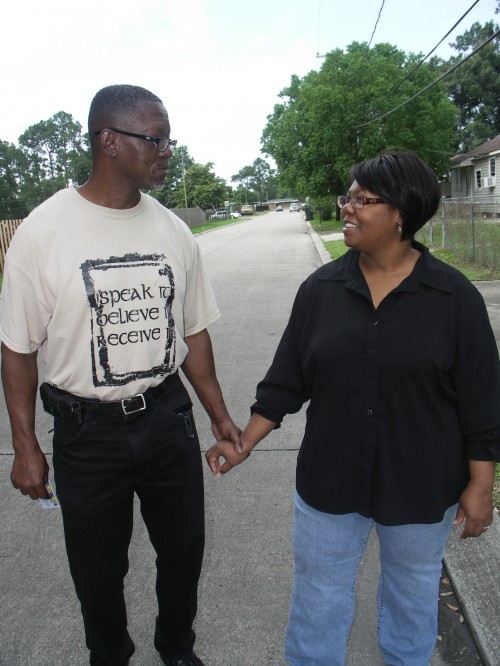
Group seeks to make Thibodaux parks smoke-free
May 23, 2012
Simulator makes an impression on would-be distracted drivers
May 23, 2012Anderson Wallace Jr. contends that the important part of his story is not how a drug user that did prison time was reformed. His message involves addressing young people turning to destructive behavior, adults hiding inside their homes and allowing neighborhoods to be taken over by crime and blight, and changing attitudes so communities become less vulnerable to negative influences.
“Just because you have a past, it does not have to dictate your future,” Wallace said, explaining how he answers people who remember him in his rougher times and cast doubts on his intentions. “This isn’t about them. This is about getting people out of their homes, taking back the neighborhood and making it a better place for families to live.”
The 54-year-old social worker also said his message is a testimonial as to why he is taking it upon himself to lead the way as a positive influence and establish what he calls the Community Betterment Association.
“I grew up in this area,” Wallace said. “I went away. I came back. I want to do something to make it a better place.”
Behavioral Background
Wallace said he was raised by parents who encouraged him to excel in school and told him he could achieve whatever he wanted to in life.
Noting that he does not blame anyone for his decisions and behavior, Wallace explained that a positive start shifted direction when he was 15 and his parents divorced. His stability, as well as his living arrangement, became part-time and he was often left to his own devices.
“That’s when I started using drugs and drinking,” he said. “I started with marijuana but soon went to cocaine. I liked the feeling of energy [cocaine] gave me.”
Wallace began college at Nicholls State University but dropped out at the end of his second year to enlist in the U.S. Army when he was led to believe he had fathered a child – he later found out was not his – and felt obligated to provide support. “At first this was good for me and I stayed clean for a while,” he said.
Wallace soon learned, however, that the assumed image of military discipline can hide destructive drug and alcohol use within the ranks. “I was 21,” Wallace said. “I did not want to be in the drugs. I thought maybe I could get away from this there, but there it was.”
As time progressed and the habit continued, Wallace fell deeper into the influences to which he had surrendered. “There were some guys in my unit that claimed I was selling drugs,” he said. “I’ll admit, I was using, but I was not the one selling.”
Accusations and guilt by association resulted in Wallace being court martialed and sentenced to 12 years in prison.
Changed Condition
After doing time behind bars, Wallace returned to Houma, destitute and discouraged to live with his mother. He bounced job-to-job, losing one and another with each drug test. Eventually, following a workplace injury, he landed in the hospital where he had time to think and listen without other influences.
“I had still been using and drinking,” Wallace said. “But it was then, in 2004, I heard God tell me through my thoughts, ‘You’re smarter than this.’ I knew God had been trying to talk to me, but now I said, ‘I’m going to listen.’”
Wallace came to realize that with a complete education he could increase his opportunities to offer something positive. He returned to Nicholls at the age of 48, completed a Bachelor of Science degree in child family social services in 2009, went on to complete a Master of Science degree in psychological counseling by Dec. 2011, then went to work in the human services industry.
With new skills, and the credentials to go with them, Wallace found himself both in the professional position and under a moral obligation to help others in his own neighborhood.
“We live where our neighbors don’t know one another,” Wallace said. “I’m saying come out and get to know each other.”
During 2012, Wallace has conducted a voter registration drive and organized neighborhood meet-and-greet activities. “We can organize ourselves and make things like they use to be when neighbors watched out for one another,” Wallace said. “It is time to stop drinking and start thinking. Stop drugging and start hugging. We can help elderly people get their medicine and help people in need get food. It is a matter of looking out for one another like people used to do.”
Neither local law enforcement agencies nor the U.S. Department of Justice were able to immediately offer statistical specifics on the results associated with taking back the neighborhood initiatives.
The DOJ contends that research in this field is “complicated.” Studies that have been conducted are mostly anecdotal. Results also vary widely.
One DOJ report looked at 18 studies and paired neighborhood watch areas with similar neighborhoods that had no neighborhood watch or organized effort among residents. In 15 of the 18 cases, crime fell when there was residential participation.
“In 2011 we had the largest crime reduction in Houma since 1987,” Houma Police Chief Todd Duplantis said. “I credit that to the neighborhood watch programs.”
Actions and Reactions
“So we are going to have something every month,” Wallace said. “I applied it to the counseling discipline of cognitive behavioral therapy. If you change a person’s thinking you can modify their behavior to make them feel better about themselves. In order to do that, I can lead community events. So I’m going to do that.”
“I’m here to support him not only as a wife, but as a person in the community,” Wallace’s spouse, Valerie, said. “I grew up here, too, and know it can be a better place. I believe what he is doing is wonderful.”
“I think it is an admirable thing Mr. Wallace is doing,” Terrebonne Parish Dist. 1 Councilman John Navy said. “More people need to be active in the community. The interesting thing is that when people like Anderson get together and get active, it does make a difference. What he is doing is something that is needed and I support it 100 percent.”
In his efforts to encourage positive neighborhood behavior, Wallace said it is necessary to stand up against negative behavior. “Police can only respond after something has happened,” he said. “It takes others to step up and say, ‘Hey, we’re not going to have any of that here.’ It is our children that are getting into trouble, so we need to take responsibility to change it. We need to do for ourselves.”
“I would encourage Mr. Wallace to get involved in one of the four Neighborhood Watches we have in the Mechanicville area,” Duplantis said. “I applaud his efforts and hope he gets involved in our meetings as well. It is about sharing ideas, discussing problems and addressing problems. It’s not just about crime, but downed stop signs and tall grass, anything, but he is right, it takes people getting involved to make it work.”
Wallace has sought moral support in his efforts from government officials and church congregations. He has received positive comments, but admitted the idea for his Community Betterment Association has not yet caught on to the degree he envisions.
“I’ve talked to people and had everyone I talk to say, “This is a good idea,’” Wallace said. “But, I’ll admit, as I talk to them and pass out my fliers, I have yet to have anyone call and ask, ‘How can I get involved?’”
Wallace said that some people have offered financial donations, but the real need is to have individual participation before lasting positive changes can be made. “This is still in its inception,” he said. “I think it is viable. People today need parenting skills and life skills and as we develop this association we can develop programs to address what is going on here.”
Confronting Challenge
The obstacle in Mechanicville and other neighborhoods identified as problem areas are that residents have surrendered living by set standards, according to Wallace. He said that structured programs are available to address multiple social issues, but lasting results come only when residents individually and as a group take action to reclaim their neighborhoods.
“Don’t expect someone else to do for you,” Wallace said. “If I want something better I better get up and go get it for myself. There are people who oppose me in this. There are people that will try to block you because people have their own selfish interest at heart. I’ve had obstacles, but I have learned how to step aside of them.”
On the street outside Wallace’s home is a section of concrete that was patched decades ago. Imprinted in the long-hardened aggregate mixture are a set of a young person’s footprints and his scrawled former nickname of Weedhopper. That marker exists as a reminder to Wallace of who he once was. He now hopes to make a new permanent mark, as the person he has become. “My past is not going to dictate my future,” he said.
For details regarding the Community Betterment Association call (985) 232-9289. The Houma Police Department Neighborhood Watch program can also be contacted at (985) 873-6371.
Anderson and Valerie Wallace take a morning walk in the Mechanicville neighborhood where they live and indent to model a positive example by hosting community events.











